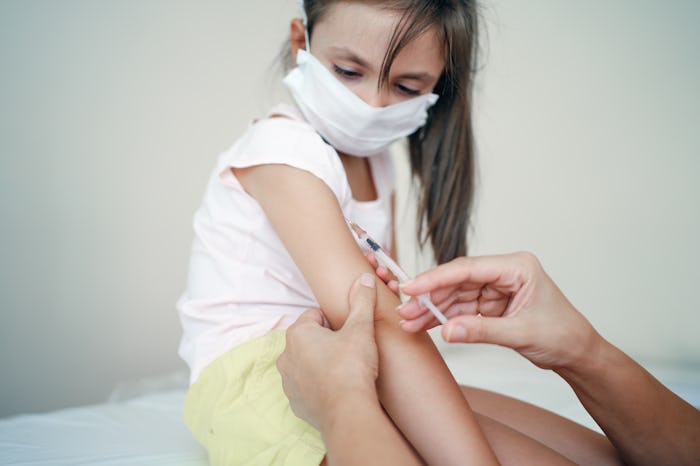Life

This Is When You Can Expect Flu Season To Start In 2020, According To Experts
It’s back-to-school season, which means your kid is bound to get sick at some point. But while in past years your kid might have come home with a stuffy nose or a sniffle, this year brings not just the common cold, but concerns about COVID-19 — and influenza, too. So when does flu season start in 2020? It’s important to be prepared, after all.
While it’s hard to pinpoint exactly when the flu starts, it’s typically around the time of sweater weather and all things pumpkin spice-flavored. “Influenza season starts at different times for different states throughout the country, but, in general it begins in late fall and runs through early spring,” Priya R. Soni, M.D., FAAP, an assistant professor of pediatric infectious diseases, tells Romper in an email. “For most of the U.S., our highest number of cases are typically reported in January and February.”
That doesn’t mean that you should delay getting your yearly flu shot, though. In fact, symptoms can start to appear as early as October or November, Dr. Soni says. “Most medical providers start administering the vaccine in early September so that by the time the incidence of new cases rises, most of the population is covered and protected by the good antibodies induced by the vaccine,” she says. So if you’re thinking about getting your child and your family the flu shot, there’s no time like the present. “The best and optimal time to get vaccinated is in September and October, with the goal to have children vaccinated before the end of October,” says Dr. Soni. Even if you miss this window, you should still get the flu shot for yourself and your kids. The Centers for Disease Control and Prevention (CDC) recommends that babies ages six months and older get vaccinated.
And if you’re wondering how COVID-19 is going to play out alongside the typical flu, you’re not alone. “This year’s flu season will be compounded by the ongoing COVID-19 pandemic, and that is why it’s even more important to get your flu shot, for everyone 6 months and older,” Dr. Syra Madad, a pathogen preparedness expert and infectious disease epidemiologist, tells Romper in an email. “This year’s flu vaccine strains have been updated to better match this flu seasons potentially circulating viruses.”
Still, having the common cold, COVID-19, and the flu playing out simultaneously can be dangerous, not just for your family’s health, but the healthcare system as a whole. “The major concern is that a large influenza epidemic can crowd out health care resources if we have a simultaneous second wave of COVID-19,” Troy Tassier, an associate professor of economics at Fordham University and author of The Economics of Epidemiology, tells Romper in an email. “So, we need a large portion of the population to be vaccinated against influenza to save healthcare resources for COVID-19.” The Centers for Disease Control estimated that there were between 24,000-62,000 flu-related deaths from October 2019 to April 2020 (and a staggering 410,000-740,000 flu-related hospitalizations). “Only around 2/5 of the US population gets their annual influenza vaccine,” says Tassier. “If we could double that percentage, we could reach herd immunity and nearly eliminate the presence of influenza in most years.”
Now, if you've ever felt feverish after you've gotten a flu shot (and thought that you actually got influenza), you're not alone. But if you're fearful that the influenza vaccine could cause a flare-up of the flu, don’t worry. “Usually what happens after a child is given the flu vaccine is a normal immune response,” says Dr. Soni. “We want this to occur as this means the child’s immune system is reacting and responding properly.” The CDC reports that typical post-shot side effects include mild fever, soreness at the site of injection and fatigue. Giving your child some Tylenol prior to the shot can help manage most of the malaise.
So, here’s the silver lining. All of the measures that people have taken in the wake of the coronavirus (i.e. proper hand hygiene, social distancing, and wearing a mask), just might make this year’s flu season slightly more manageable than former flu seasons. “Given the social distancing, mask wearing and respiratory etiquette measures for COVID-19, we may experience a flu season with lower flu activity,” says Dr. Madad. “However, this is yet to be seen.”
That’s why you should schedule your child’s flu shot now, and make sure that they wear their mask, wash their hands, and keep up with the pandemic protocol. It just might keep all of you safe — and healthy.
Experts:
Dr. Priya R. Soni, M.D., FAAP, an Assistant Professor of Pediatric Infectious Diseases
Dr. Syra Madad, a pathogen preparedness expert and infectious disease epidemiologist
Troy Tassier, an associate professor of economics at Fordham University